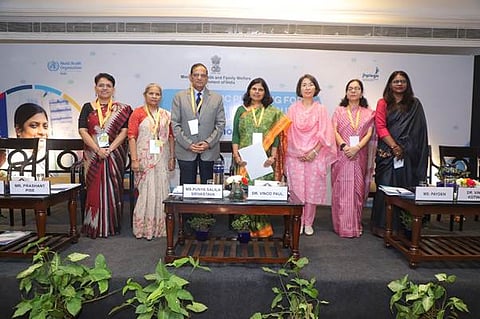

The Union Ministry of Health and Family Welfare, in partnership with the World Health Organization (WHO) and Jhpiego, has launched a three-day National Consultation and Experience Sharing Workshop on Nursing Policy Priorities and Best Practices in India. The workshop, which began today, seeks to strengthen policy dialogue and drive reforms in the country’s nursing and midwifery sector.
The event brings together key stakeholders, including policymakers, senior government officials, regulators, nursing educators, professional associations, and development partners from across India. The consultation aims to review ongoing initiatives, address emerging challenges, and showcase innovative models to enhance nursing governance, education, and workforce management in line with India’s health priorities and the Sustainable Development Goals (SDGs).
Addressing the gathering, Smt. Punya Salila Srivastava, Union Health Secretary, highlighted that nurses and midwives form the backbone and one of the most important pillars of India’s healthcare system. She emphasized that, along with Ayushman Aarogya Mandir and ASHA workers, they are instrumental in achieving Universal Health Coverage (UHC).
She also noted that, India’s recent reforms, including the establishment of the National Nursing and Midwifery Commission (NNMC), adoption of competency-based curricula, and initiatives to modernize regulatory frameworks, are major milestones in strengthening the nursing ecosystem.
She further underscored that the best practices emerging from each State during this workshop should serve as guiding inputs for national policy formulation, and other States should take note of these models for wider replication and improvement of the nursing sector across the country.
Speaking at the occasion, Professor V.K. Paul, Member Health, Niti Aayog, commended the Ministry of Health and Family Welfare and WHO for convening this important consultation. India’s health system is globally recognized for providing quality healthcare, owing significantly to the strength and dedication of its nursing workforce. He reiterated that nursing is the backbone of India’s comprehensive healthcare system, He added.
Expressing concern over the quality of training of nurses, Dr. Paul noted that this remains a critical area of focus. He stressed the need for reforms in nursing education and called for greater emphasis on in-service training and skill enhancement to ensure high standards of care and professional excellence.
Speaking at the occasion, Dr. Payden, WHO Representative to India, lauded the country’s significant progress in advancing the nursing and midwifery sector. She highlighted that India has emerged as one of the world’s largest contributors to the global nursing workforce. Dr. Payden also observed that the projected decline in the shortage of nurses in the WHO South-East Asia Region by 2030 can be largely attributed to the advancements and policy initiatives undertaken by India.
Participants discussed key policy priorities, including equitable workforce distribution, quality assurance in nursing education and training, leadership development, and career advancement opportunities for nursing professionals. They underscored the need to align national nursing strategies with the findings of the State of the World’s Nursing 2025 Report and to strengthen international collaborations for capacity-building and adoption of global best practices.
Over the three days, the workshop will feature technical sessions, panel discussions, and state-level presentations highlighting innovations in nursing education, workforce planning, and digital learning. The deliberations are aimed at promoting evidence-based policymaking and fostering cross-state learning to build a resilient, skilled, and empowered nursing workforce across India.